Rehabilitation as a key strategy for the COVID-19 pandemic.
A longitudinal study published in mid-July suggests that coronavirus re-infection is likely, which means the virus will stay here. This has far-reaching implications for the provision of health services, as we have to fight the virus not only now, but probably also seasonally. We will have post-covid survivors for the foreseeable future and they will have unique needs when it comes to regaining physical strength and function. Our profession will be the key to enable rehabilitation in the different phases of the disease. Therefore, it is our duty to ensure that we are all up to date and ready to help global needs wherever our local community is.
Physioplus is also committed to this cause and that's why we made all of our COVID-19 courses available free of charge via a test account. This includes the latest 5 course program with a focus on rehabilitation. The courses are designed to provide an overview of rehabilitation in different environments and populations and enable us to treat the patient in the post-acute phase and in the community during this pandemic.
The new courses
COVID-19 post-acute rehabilitation
People with severe COVID-19 infection have rehabilitation needs in the acute, post-acute and long-term phases of the disease. Many people who have had COVID-19 may now be at risk of long-term impairment or disability. Physiotherapists are critical to rehabilitation efforts in all phases of this disease. Rehabilitation has a positive impact on health and functioning, improves recovery and can reduce disabilities, facilitate early discharge and reduce the risk of readmission. Physiotherapists also play a key role in supporting and empowering people through rehabilitation processes.
Rehabilitation is the key to long-term recovery
COVID-19 and Community Rehabilitation
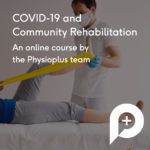 During the pandemic, an increase in the need for rehabilitation of COVID-19 patients after their discharge from the hospital is expected. Rehabilitation services in local communities are often the best prerequisites for rehabilitation and long-term care. Physiotherapists in the community will play a key role in the ongoing rehabilitation of survivors of COVID-19 to optimize the recovery of these patients.
During the pandemic, an increase in the need for rehabilitation of COVID-19 patients after their discharge from the hospital is expected. Rehabilitation services in local communities are often the best prerequisites for rehabilitation and long-term care. Physiotherapists in the community will play a key role in the ongoing rehabilitation of survivors of COVID-19 to optimize the recovery of these patients.
What role do we play in the community?
COVID-19 rehabilitation in vulnerable populations
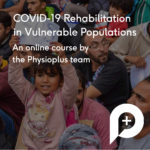 COVID-19 poses a serious threat to all communities, but refugees, displaced people, and people in low-income areas face even greater challenges. This course introduces the problems of refugees / displaced persons in camps and camp-like environments and examines various options that can help reduce the transmission of COVID-19 in those at high risk in these environments.
COVID-19 poses a serious threat to all communities, but refugees, displaced people, and people in low-income areas face even greater challenges. This course introduces the problems of refugees / displaced persons in camps and camp-like environments and examines various options that can help reduce the transmission of COVID-19 in those at high risk in these environments.
Vulnerable population groups face even greater challenges
The importance of continuous rehabilitation care during COVID-19
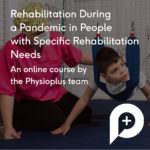 It is critical that rehabilitation for people with specific rehabilitation needs continues even during a pandemic. The COVID-19 pandemic has prompted countries to take stringent infection control measures, such as social distancing and restricting people's regular movement. A lack of access to rehabilitation could have a serious impact on the health outcomes of people with specific ongoing rehabilitation needs. Physiotherapists have to make difficult decisions regarding the continuation of rehabilitation services during the COVID-19 outbreak. Changes in rehabilitation services due to pandemic restrictions will have a significant impact on today and the future.
It is critical that rehabilitation for people with specific rehabilitation needs continues even during a pandemic. The COVID-19 pandemic has prompted countries to take stringent infection control measures, such as social distancing and restricting people's regular movement. A lack of access to rehabilitation could have a serious impact on the health outcomes of people with specific ongoing rehabilitation needs. Physiotherapists have to make difficult decisions regarding the continuation of rehabilitation services during the COVID-19 outbreak. Changes in rehabilitation services due to pandemic restrictions will have a significant impact on today and the future.
Rehabilitation must continue during the pandemic
Innovative approaches to providing rehabilitation during COVID-19
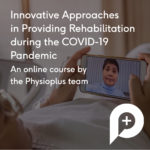 COVID-19 is currently putting significant pressure on health services worldwide. A significant number of patients infected with COVID-19 become seriously ill and must be treated at the hospital level. Your ongoing rehabilitation requirements will often be high. However, due to the pandemic, rehabilitation professionals are unable to perform their usual services for both COVID-19 and non-COVID-19 patients. This course explores innovative approaches that rehabilitation professionals can use to ensure that they can continue to deliver important rehabilitation services during the COVID-19 pandemic.
COVID-19 is currently putting significant pressure on health services worldwide. A significant number of patients infected with COVID-19 become seriously ill and must be treated at the hospital level. Your ongoing rehabilitation requirements will often be high. However, due to the pandemic, rehabilitation professionals are unable to perform their usual services for both COVID-19 and non-COVID-19 patients. This course explores innovative approaches that rehabilitation professionals can use to ensure that they can continue to deliver important rehabilitation services during the COVID-19 pandemic.
It's time for innovation
The COVID-19 course collection
COVID-19 and Nutrition
 Nutrition is not a cure for COVID-19, but it does make a modifiable contribution to the development of chronic diseases associated with serious COVID-19 diseases. A balanced diet strengthens the immune system and reduces the risk of chronic diseases and infectious diseases. Every physiotherapist should be aware of the benefits of a healthy diet and be able to offer his patients, especially patients with chronic diseases, well-founded nutritional advice.
Nutrition is not a cure for COVID-19, but it does make a modifiable contribution to the development of chronic diseases associated with serious COVID-19 diseases. A balanced diet strengthens the immune system and reduces the risk of chronic diseases and infectious diseases. Every physiotherapist should be aware of the benefits of a healthy diet and be able to offer his patients, especially patients with chronic diseases, well-founded nutritional advice.
Take this course now to optimize your patient's diet.
COVID-19 and physical activity
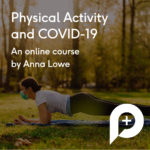 The COVID-19 pandemic is an unprecedented time worldwide. Extensive social distancing policies have been applied that limit the daily activities of people around the world. These social distancing and blocking measures mean that people have far fewer opportunities to be physically active. Although these extreme measures are important and necessary in a time like today, our body and mind still need physical activity and the many advantages that come with it. This course focuses on the importance of physical activity even during closure and the effects of physical inactivity during off-periods. The role of physical activity as part of physiotherapy interventions during COVID-19 is also highlighted.
The COVID-19 pandemic is an unprecedented time worldwide. Extensive social distancing policies have been applied that limit the daily activities of people around the world. These social distancing and blocking measures mean that people have far fewer opportunities to be physically active. Although these extreme measures are important and necessary in a time like today, our body and mind still need physical activity and the many advantages that come with it. This course focuses on the importance of physical activity even during closure and the effects of physical inactivity during off-periods. The role of physical activity as part of physiotherapy interventions during COVID-19 is also highlighted.
Physical activity is more important than ever
Mental health during the COVID pandemic
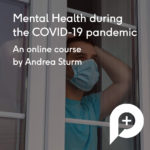 The global outbreak of the novel corona virus affects everyone – patients, health professionals and the general public. An important aspect of human well-being is mental health, which is likely to be overlooked when responding to a pandemic. In this course, we learn how mental health can be affected by patients and health professionals, and introduce relevant management strategies.
The global outbreak of the novel corona virus affects everyone – patients, health professionals and the general public. An important aspect of human well-being is mental health, which is likely to be overlooked when responding to a pandemic. In this course, we learn how mental health can be affected by patients and health professionals, and introduce relevant management strategies.
Now help both your own and the mental health of your patients
COVID-19 and sleep
 Fatigue, sleep deprivation and stress are common among health professionals, particularly during the COVID-19 pandemic. Sleep and the body's immune system are inextricably linked. Deprivation of sleep may affect the body's immune response, negatively affect inflammatory homeostasis, and may also increase the risk of infection and worsen clinical conditions caused by a disease such as COVID-19. It is imperative to consider sleep health in the interest of health professionals and their patients, especially during the stresses that arise during a pandemic.
Fatigue, sleep deprivation and stress are common among health professionals, particularly during the COVID-19 pandemic. Sleep and the body's immune system are inextricably linked. Deprivation of sleep may affect the body's immune response, negatively affect inflammatory homeostasis, and may also increase the risk of infection and worsen clinical conditions caused by a disease such as COVID-19. It is imperative to consider sleep health in the interest of health professionals and their patients, especially during the stresses that arise during a pandemic.
Sleep is essential for recovery
Understanding COVID-19
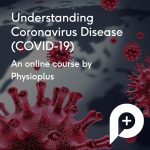 Coronaviruses are a family of viruses that cause diseases such as respiratory or gastrointestinal disorders. In January 2020, a previously unknown corona virus was identified in Wuhan China. The group of diseases associated with infection with this new virus has been designated by the World Health Organization (WHO) as Coronavirus Disease 2019 (COVID-19). After rapidly spreading around the world, WHO has declared COVID-19 a pandemic. It mainly shows breathing difficulties, fever and can lead to severe acute shortness of breath in high-risk populations.
Coronaviruses are a family of viruses that cause diseases such as respiratory or gastrointestinal disorders. In January 2020, a previously unknown corona virus was identified in Wuhan China. The group of diseases associated with infection with this new virus has been designated by the World Health Organization (WHO) as Coronavirus Disease 2019 (COVID-19). After rapidly spreading around the world, WHO has declared COVID-19 a pandemic. It mainly shows breathing difficulties, fever and can lead to severe acute shortness of breath in high-risk populations.
Understanding Corona Virus
Infection Prevention and Control
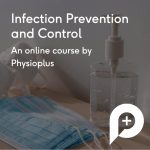 Infection prevention and control procedures and techniques are essential for good public health to limit healthcare-acquired infections and the general spread of epidemics and control pandemics. An essential part of this is basic hand hygiene, which forms the basis for infection control. The use of personal protective equipment (PPE) such as gloves, masks, robes and goggles enables medical personnel to treat patients with communicable diseases and to protect themselves and others. The procedures for putting on (putting on) and taking off (taking off) PSA must follow certain sequences and techniques to ensure the best methods of infection control and prevention.
Infection prevention and control procedures and techniques are essential for good public health to limit healthcare-acquired infections and the general spread of epidemics and control pandemics. An essential part of this is basic hand hygiene, which forms the basis for infection control. The use of personal protective equipment (PPE) such as gloves, masks, robes and goggles enables medical personnel to treat patients with communicable diseases and to protect themselves and others. The procedures for putting on (putting on) and taking off (taking off) PSA must follow certain sequences and techniques to ensure the best methods of infection control and prevention.
The best method for limiting the spread
Role of Physiotherapy in COVID-19
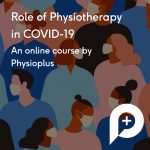 Coronavirus Disease 2019 (COVID-19) has led to a global pandemic that affects a large number of countries in the world. As a front line practitioner, it is likely that physiotherapists and physiotherapists will come into direct contact with patients who are infected with this virus. It is therefore important that they understand the many aspects of their role in identifying, containing, alleviating and treating the symptoms of this disease. This includes implementing methods to reduce the transmission of COVID-19, initiating strategies for early detection and the appropriate treatment of identified cases in the clinic and at home. Note: A detailed review of the physiotherapeutic airway care of these patients will be treated in a subsequent course.
Coronavirus Disease 2019 (COVID-19) has led to a global pandemic that affects a large number of countries in the world. As a front line practitioner, it is likely that physiotherapists and physiotherapists will come into direct contact with patients who are infected with this virus. It is therefore important that they understand the many aspects of their role in identifying, containing, alleviating and treating the symptoms of this disease. This includes implementing methods to reduce the transmission of COVID-19, initiating strategies for early detection and the appropriate treatment of identified cases in the clinic and at home. Note: A detailed review of the physiotherapeutic airway care of these patients will be treated in a subsequent course.
Physiotherapy and COVID-19 management
COVID-19 breath management
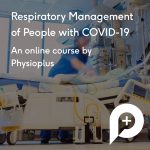 Approximately 15% of people with COVID-19 develop a moderate to severe illness and require hospitalization and oxygen support, another 5% require admission to an intensive care unit and supportive course Therapies including intubation and ventilation. The most common complication in severe COVID-19 patients is severe pneumonia. However, other complications can include acute respiratory distress syndrome (ARDS), sepsis and septic shock, multiple organ failure, including acute kidney injury and heart injury. Physiotherapists need to understand their role in treating patients with COVID-19 in the acute hospital setting and also in rehabilitation after recovery from the disease.
Approximately 15% of people with COVID-19 develop a moderate to severe illness and require hospitalization and oxygen support, another 5% require admission to an intensive care unit and supportive course Therapies including intubation and ventilation. The most common complication in severe COVID-19 patients is severe pneumonia. However, other complications can include acute respiratory distress syndrome (ARDS), sepsis and septic shock, multiple organ failure, including acute kidney injury and heart injury. Physiotherapists need to understand their role in treating patients with COVID-19 in the acute hospital setting and also in rehabilitation after recovery from the disease.
Breath management of COVID-19